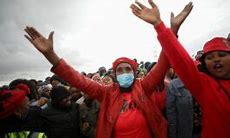South African voters will go to the polls on Monday to elect local representatives, with the ruling African National Congress (ANC) facing its most severe test since the end of apartheid.
South Africa’s Constitutional Court in September ordered municipal elections to be held this year, rejecting a request by the Independent Electoral Commission (IEC) for a postponement, fearing the COVID-19 pandemic would make it difficult to organize free and fair elections.
“The ballot will be conducted in accordance with the court ruling, notwithstanding the challenges we face in holding this election,” IEC president Glen Mashinini told Al Jazeera.
The shortened eight-week campaign period has prompted political parties to scramble to convince a sceptical electorate to back them in an election that will decide who will be responsible for providing basic services such as water and electricity.
The ANC, which has won every general election since the end of the white minority regime in 1994 but is mired in corruption scandals and internal political struggles, has vowed to reform and renew its offer to the people.
“We know that some of our advisers have moved away. Others seem arrogant and indifferent to the challenges our people face. It ends with this election, ”South African President and ANC leader Cyril Ramaphosa told party candidates when signing a service pledge in mid-October.
The engagement aims to ensure that ruling party representatives focus on public service and to improve the ANC’s track record in local government.
“After signing this commitment, it is your bond, your commitment. You have to take it wherever you go, ”said Ramaphosa.
The ANC currently heads 176 of South Africa’s 213 councils, but it is projected to lose votes in many municipalities.
A report of the National Department of Co-operative Governance and Traditional Affairs (Cogta) showed that most municipalities in South Africa are facing financial problems and are on the verge of collapse.
“You just have to go to any municipality currently run by the ANC and you will see that it is a disaster,” the leader of the official opposition, the Democratic Alliance (DA) told Al Jazeera. , John Steenhuisen.
“You will see people living in extreme poverty with no services, the sewage flowing in the streets and electricity which is spotty at best. “
The DA currently manages 24 municipalities, including large centres like Cape Town, Tshwane – home to the capital, Pretoria – and Nelson Mandela Bay, which includes Port Elizabeth.
He hopes to increase his footprint as smaller parties battle for votes as well, leading analysts to speculate that coalition or even minority governments could come in after the poll.
However, despite being a municipal election, issues unrelated to the local governance, such as reluctance to COVID-19 vaccination and xenophobia, were also used as campaign tools.
Several parties from all political backgrounds have pledged to either prevent COVID-19 vaccination warrants or deport undocumented immigrants.
“False messages and half-truths are starting to take hold in some corners of the countryside,” Ebrahim Fakir, policy analyst at the Auwal Socio-Economic Research Institute (ASRI), told Al Jazeera.
“Where incorrect information is used to stir up emotion and get people to vote based on fears involving national issues that cannot be changed in a local election.”
Religion was also widely used in majority party campaigns, an unusual move in South African elections, with ideologically divergent parties promising a return to traditional values and even a reintroduction of religious education in schools – another competence of the non-local government.
“The South African community is in fact a deeply religious community. However, we haven’t seen this religiosity or religious conservatism actually translate into the partisan politics that we are starting to see now, ”Professor Farid Esack, an expert in religious studies at the University of Johannesburg, told Al Jazeera.
Yet economic issues remain the most important for many voters in this election, especially among more than half of the population who live in poverty.
“I don’t have a place to sleep. But here in Johannesburg, I realize that life is different now because of COVID-19 and politics. They promised us a lot of things – we have to vote but empty promises. They never give us anything, never, ”Johannesburg resident Zolani Maine told Al Jazeera.
And even those who are lucky enough to have a job in a country where the unemployment rate exceeded 34 per cent feel the pinch. Last year, the economy affected by the pandemic collapsed 6.4% and this year it is only expected to rebound by 5%.
“The situation is getting worse every year,” Minenhle Mhlanga, owner of an electronics store in downtown Johannesburg, told Al Jazeera.
“It’s like nothing is easy. Business is slow – customers come and go but people don’t work and no one has money these days.
Despite growing desperation and discontent, analysts are concerned about low voter turnout.
“It is essential for economic growth to have basic services provided by local government, but many communities have evolved,” said economist Sanisha Packirisamy.
“Whenever possible, people get out of the network and stop relying on services. Communities and businesses are doing the job because municipalities have failed.

